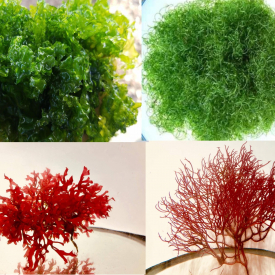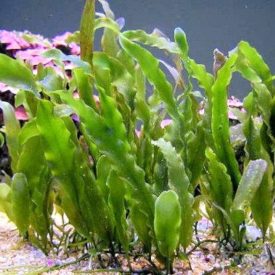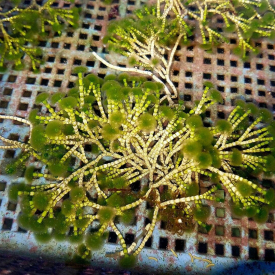LIVE Saltwater Starter Kit 16oz Liquid Coralline Algae, Chaeto, LIVE Sand
Coralline algae are red algae in the order Corallinales. They are characterized by a thallus that is hard because of calcareous deposits contained within the cell walls. The colors of these algae are most typically pink, or some other shade of red, but some species can be purple, yellow, blue, white, or gray-green.
$49.99
THIS LISTING INCLUDES
1 Cup Chaeto Algae, 1 Cup LIVE Sand, and 16oz Liquid Coralline Algaes
So you want to take your saltwater aquarium to the next level? Even if you’ve never operated a reef tank before, establishing and maintaining coralline algae is surprisingly easy.
The cheapest and easiest way to add coralline algae into your tank is to introduce a live rock, or anything else that’s encrusted with the algae, including snails! While many believe snails will eat and destroy coralline algae, the vast majority of reef aquarium snails species aren’t typically interested in having coralline for dinner. In fact, the additional of snails can boost reef tank fauna.
While adding coralline into your tank is a breeze, there’s more to cultivating healthy growth. Don’t worry, if you follow the three pillars of growing coralline you’ll do just fine!
Pillar #1 – Lighting Fundamentals.
The root of healthy growth comes down to lighting. While lighting preferences vary based on algae type and the tank environment, there’s a couple of rules to keep in mind when establishing a coralline colony:
The Best Lighting…Maybe? – There’s no such thing as a lighting solution that’s best for every coralline algae. It seems every algae has its own unique preferences. But what I’ve found is the vast majority of coralline algae grows well when 10,000K and Actinic Blue lights are used at an intensity of 1.6 watts per tank gallon. My advice? Continually adjust lighting to satisfy your coralline. Be patient and observant!
Natural Light Cycles – Maximize growth potential with light cycles that mimic sunlight durations.Because coralline algae is photosensitive, excess exposure to light can result in light shock, which turns damaged portions white. However, not all white spots are caused by light shock. Astrea starfish eat the film along the surface of coralline, which bleaches the damaged areas.
Pillar #2 – Stable Tank Parameters.
Aquatic life, including coralline algae, thrive when water parameters remain relatively stable at all times. This typically requires regular water testing and more frequent, smaller water changes. Prevent shocking your tank by avoiding large water changes.
As a general rule of thumb, aim for the following water chemistry parameters:
Calcium – 350 to 480 ppm
Alkalinity – 2.8 to 4.3 meq/L or 7 to 12 DKH
pH – 7.9 to 8.3
Magnesium – 1300 to 1380 ppm
Phosphates – Less than 0.25 ppm
Nitrates – Less than 5 ppm
Temperature – 78 to 80 degrees Fahrenheit
Author Yuliya Ivanova
As a lifelong aquarist, Yuliya has an endless curiosity about our underwater universe. After graduating with a bachelor’s in Environmental Engineering, she transformed her passion into a successful career. While working at the Institute of Environmental Protection in Moscow, her passion for saltwater and reef aquariums only increased. Moving to the United States in 2013, Yuliya embarked on another impactful journey by sharing her unprecedented experience for all aquarium hobbyists.
While working on her new book about saltwater and reef aquariums, Yuliya is the exclusive author for ReefHacks. Her writing is designed to help both novice and experienced aquarists create and maintain healthy, happy and long-lasting aquariums.
This macro algae is one of the hardiest beginner algaes. Great for introducing into marine aquariums. As a nutrient exporter, it absorbs, or feeds on dissolved organic waste. This algae thrives on fish waste, nitrates, & phosphates. These dangerous biochemicals that we constantly strive to keep down in our saltwater aquariums, which are poison to our fish and invertebrates, are the food that this algae consumes. Thus it is a big contributor to maintaining a healthy aquarium system for our captive kept animals. So you can say it helps along with our protein skimmers to purify our water. Introducing this micro algae is a natural way of maintaining good water quality for our corals also.
16oz Liquid Coralline
LIVE Coraline Algae 4 Types!!! GREAT FOR STARTING CORALINE IN SALTWATER MARINE . Condition is New. Shipped with USPS Priority Mail.
16oz of my natural Live Coralines that i grow in a greenhouse marine lab located in the Florida Keys. Simply pour entire contents into your aquarium and watch your coraline grow in 7 to 14 days.
Contains 2 Purples, 1 Pink and 1 Lavender
LIVE Sand
The sand is cultured in our recirculating greenhouse linked to the Atlantic Ocean
Live sand, a term used in aquarism, is natural reef coral sand populated with millions of beneficial bacteria and organisms which aid in the dissolving of organic wastes like ammonia, nitrites and nitrates produced by larger organisms in saltwater aquariums. Live sand can be purchased from aquarium stores, but most hobbyists make their own by seeding dead sand with live sand from other aquarium systems.
INFORMATION ABOUT CHAETOMORPHA
Chaetomorpha is a type of macroalgae that grows in long, green strands that form into clumps. Reef aquarium hobbyists grow chaetomorpha in their tanks, because it easily absorbs nutrients from the water and is easy to care for. The plant also provides a suitable habitat for organisms in the tank, such as copepods, amphipods, and small starfish. Hobbyists who wish to grow chaetomorpha in a reef aquarium should review important growing requirements and care tips.
Growing Requirements
It is necessary to adhere to the growing requirements of chaetomorpha to help it flourish. Simulating a natural habitat for the plant also keeps the organisms that depend on it healthy. Proper environmental conditions and lighting are some of the factors that hobbyists should understand.
Planting Method
Chaetomorpha is a free-flowing plant. When adding the plant to an aquarium, gently place it near the bottom of the tank. The natural water movement of the habitat helps prevent an excessive buildup of detritus that can hinder growth. Organisms live and thrive within the clumped mass of the plant as it floats along the bottom.
Light
Like all plants, chaetomorpha algae photosynthesize, and light is a source of energy for the process. Chaetomorpha thrives in low light. One 25-watt bulb is an ideal light source for the plant to survive. Providing too much light or using bright, direct light can hinder growth or kill the plant.
Water Environment
Chaetomorpha needs a water temperature between 68 and 75 degrees Fahrenheit to thrive. Cool down warmer water with a supply of cold water on the surface or the use of an aquarium air conditioner. A proper pH level can range from seven to nine, with an optimal range of 8.2 to 8.7. Culture collapse can result from an inconsistent or improper pH levels. Aerating or mixing the culture can help keep a consistent pH level. Keep salinity levels between 20 and 24 psu.
Aeration and Mixing
Aeration and mixing prevents algae sedimentation and keeps the plant cells equally exposed to light and nutrients. It also develops a healthy transfer of gas between the culture medium and air. This is important to help the plant take in carbon dioxide to survive and thrive. Proper aeration and mixing is possible by stirring the water daily by hand or using an aquarium pump to circulate the water evenly. Paddle wheels and jet pumps work well for chaetomorpha that grows in outdoor ponds.
Pruning
Pruning is only required if the chaetomorpha plant becomes so large and dense that it begins to choke out other plant life or take over the environment. Prune the plant by gently pulling away handfuls of it and removing it from the environment. Recycle the pruned pieces of chaetomorpha by placing it in a separate tank or donating it to other hobbyists who keep reef tanks.
Spore Release
One of the most common obstacles involved with growing chaetomorpha is when the algae release spores. This happens when the algae is stressed and dying. It is easy to spot the occurrence of spore release. The plant turns white, and the water quickly becomes cloudy. Spore production results from lack of nutrition, poor lighting, or lack of pruning. Give the plant a long period of light exposure each day, followed by eight hours of darkness. Keep the pH and temperature as consistent as possible, and do not neglect pruning when the plant becomes overgrown. Supply chaetomorpha with plenty of organisms that help keep the plant clean through feeding and movement. Watch for signs of spore release each day.
Application:
You can place this algae just about anywhere. Main tank or refugium. As long as it gets some light. It does not have roots. It will just float around like in the ocean, looking like a large brillo pad. If you place it near a rock, it can grow its tendrils and entangle itself and remain anchored to the rock. Thus, you can grow it floating or attached to an object.
Another benefit of having this algae growing in our saltwater tank is that it is a haven for amphipods, copepods, mysid shrimp and snails, brittle stars, micro stars, and baby fish fry. Many small micro cleaning crew animals will set up nests in this lush algae. So growing this algae in your tank will promote the growth and well-being of the micro fauna, Zooplankton in your system.
Here at the nursery we consider this hardy species of algae an asset when it comes to keeping pristine water quality in our fish, coral, and shrimp nursery tanks.
Other benefits: By growing this macro algae in our systems, it out-competes other nuisance species like green hair algae and Cyano Bacteria (red slime) for the nutrients in the water. Thus this algae is great for keeping those unwanted destructive algae at bay or even non-existent in the tank over time. Keep in mind that the more light lumens it gets the faster and healthier it will grow. What we mean by absorbing nutrients in the tank is that by growing, it is using the nutrients in the tank for food or fuel as we sometimes refer to it. So the more it grows the more it can filter the water.
We prefer this algae for all of our filtering systems because it is the safest. Most other algae can go into a sexual faze and start releasing gametes and some inhibitory chemicals which all combined in an enclosed system, can really foul your water up almost overnight, before you know what happened.
This algae is unappealing as a food to many of the reef fish, so you can grow it in your main tank or in a refugium/sump type of setup.
Great for Seahorse systems and fish like mandarins. Seahorses will cling to and graze on all the many micro crustaceans living in the algae. Mandarins will also constantly be looking in this algae for copepods and amphipods.
IMPORTANT: Please read before buying this live product:
We guarantee live arrival of our live specimens: BUT CERTAIN CONDITIONS MUST BE MET. This being said.
The conditions are:
#1 Someone must be present to receive and inspect the package on the FIRST DELIVERY attempt.
#2 We must be notified of DOA (dead on arrival) within TWO HOURS of FIRST DELIVERY TIME.
If these conditions are met, then we will replace the DOA at no cost to you. These are live organisms. THEY CANNOT SURVIVE OUTSIDE OR IN YOUR MAILBOX FOR ANY LENGTH OF TIME. We are very flexible when it comes to meeting your needs and providing excellent service. So please work with us and let us know if you have special needs for delivery. If you prefer next day express overnight. Email us before you pay and we can weigh your order and fix your invoice so you can receive your package overnight. Also instructions like “Hold at Post Office for pick up” can be arranged. These are sent with tracking info so you can estimate when your package will arrive.







There are no reviews yet.